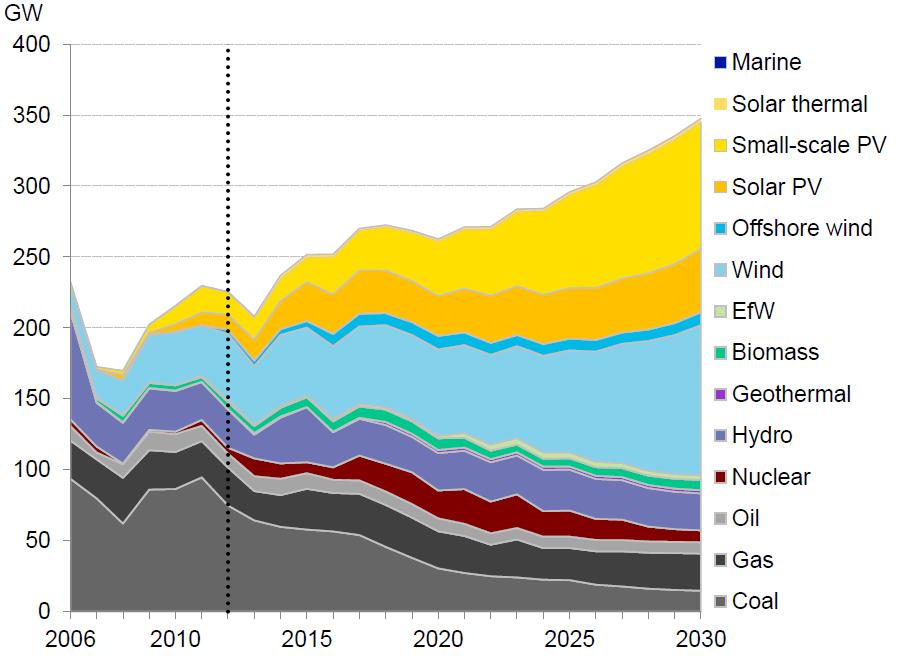Search Results for Tag: investment
Renewables, it’s time to lead. By 2030.
Fossil fuel enthusiasts need to wrap up warmly by 2030. Because major investments in new power supply will be handed over from coal and gas to renewables, worldwide. They will account for up to 70 percent, according to calculations by Bloomberg New Energy Finance. Where do these numbers come from? Well, Bloomberg analysts reviewed gas prices, carbon prices, counted in the dwindling price of green energy technology, and overall energy demand. The result is that solar and wind are going to beat fossil fuels like coal and natural gas by 2030.

Annual installations of new power sources, in gigawatts; over time.
Picture credit: Bloomberg New Energy Finance
„The likeliest scenario implies a jump of 230 percent,“ they say, compared to 2012. In total numbers: $630bn will be invested per year. According to Bloomberg New Energy Finance wind and solar will take up the largest shares of new power capacity, accounting for 30% and 24% respectively.
But, of course, the good news comes with a flipside: Fossil fuels historically are mounted to the power markets that even this projected massive growth is not enough to change completely towards sustainability. By 2030, non-renewable sources will still account for half of the world’s total power supply, according to the analysis.
Climate Change – Back at Business
This year’s edition of the World Economic Forum (WEF) is up and running at the Swiss mountain resort Davos. It’s the place to be, if you have anything to do with finance and business today. Everyone has descended on Davos, from high level media people to the top notch of the business elite. And there’s no shortage of topics on the agenda this year – the lack of global growth, the euro crisis, of course, and what’s happening in the Middle East. Nothing new here.
But surprisingly there IS something new and unexpected on the delegates’ plates, and it’s called climate change. It’s about time, isn’t it? As if to make a point, a collection of reports that call for prompt and substantial action on climate change, development and sustainability is quite impressive, writes the executive director of the Stockholm Environment Institute, Johann L. Kuylenstierna at RTCC, the official observer to the United Nations climate change negotiations.
There certainly have been a lot of eye-opening climate events over the last year that have grabbed the headlines and left plenty of people baffled. Like the highly debated “pause” in the rise of global temperatures, the inconceivable return of Arctic sea ice or temperatures in Australia that were so high that the Bureau of Meteorologists had to add an extra color to its heat scale.
Two days ago, UN Secretary General Ban Ki-moon called climate change a top priority issue alongside with Syria. That may help the 2,500 people in Davos focus on the climate.
There are quite a few papers and reports that take a look at climate change and it’s implications. The Green Growth Action Alliance led by former Mexican President Felipe Calderón quotes figures that are a stiff wake-up call: some $14 trillion will be needed, say researchers, to be spent on low-carbon industry and infrastructure until 2030. That translates to an investment of $700 billion a year! Calderón’s message is clear: there is no time to waste.
And there’s more: The Global Risks Report 2013 says that stresses on economic and environmental systems are on a “collision course” that could pose “unprecedented challenges” to global and national resilience. Others build cases for addressing climate issues in supply chains and as a strategic response to consumer demands.
None of this is exactly new. But the sheer number of notes or speeches lately could give the climate some momentum in Davos and beyond. Even the fact that US president Barack Obama declared it necessary for the United States to respond to climate change may have been an important sign in itself.
Barack Obama on Climate Change

Barack Obama (Photo: CC BY 2.0: Pete Souza/Ethan Bloch/flickr.com: http://bit.ly/WFXYGs)
You might know the situation when politicians are talking and you are just wondering, whether the “facts” they name are actually true and how they fit into a larger context? That’s how we felt, when we read the statements of US presidential candidates during the pre-election period concerning climate change. It’s custom that candiates are asked 14 questions from American scientific community and one of those questions always addresses climate change (which wasn’t really subject to election campaigns). This year the question for re-elected President Barack Obama and his rival Mitt Romney was the following:
The Earth’s climate is changing and there is concern about the potentially adverse effects of these changes on life on the planet. What is your position on cap-and-trade, carbon taxes, and other policies proposed to address global climate change—and what steps can we take to improve our ability to tackle challenges like climate change that cross national boundaries?
As the US are economically and environmentally quite powerful country, it really matters what the future president’s standing is. So we grabbed three statements of each candidate and had a look what’s behind it.
![]() read more
read more





Feedback